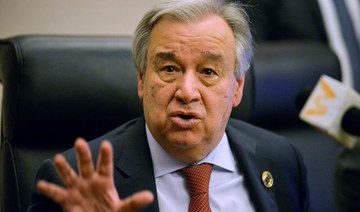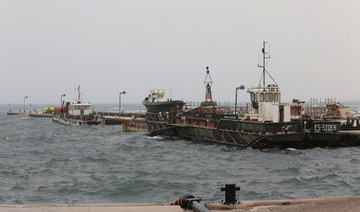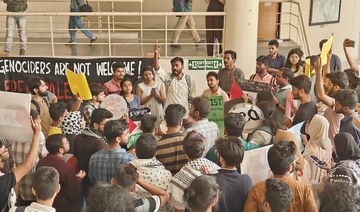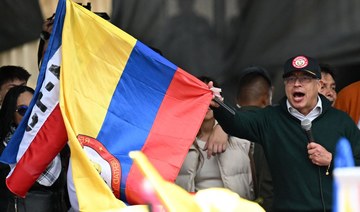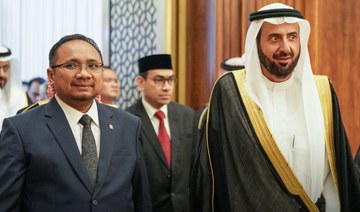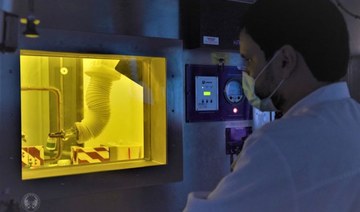CAIRO: A military buildup around the Libyan city of Sirte has raised fears of a major battle for control of the area’s strategic oil reserves.
The Libyan National Army (LNA), which has occupied Sirte since May, accused Turkey of targeting the oil-rich city and supplying militias in the area with weapons.
LNA spokesman Ahmed Al-Mesmari said that western Libya is under total Turkish control.
He said that Turkey aims to reach Libya’s “oil crescent,” a coastal region home to most of its oil export terminals.
The LNA is closely monitoring Turkey’s moves in Sirte and Al-Jufra, he added.
“We expect an attack on Sirte by Turkey and the militias at any time,” Al-Mesmari said.
His statement was confirmed a few days ago on a social media account affiliated with Turkey, which posted a map of areas under its control as well as the latest developments in Libya. The map showed areas under the control of Khalifa Haftar, LNA commander, and the Government of National Accord (GNA). It also featured arrows illustrating that Sirte and Al-Jufra are the next targets of the GNA, despite a no-fly zone on the area imposed by the LNA.
The developments led UN Secretary-General Antonio Guterres to warn on Wednesday against a military buildup near Sirte, which is located between the capital Tripoli and Benghazi.
The warning came after LNA troops led by Haftar retreated and GNA troops led by Fayez Al-Sarraj, prime minister of the GNA of Libya, advanced.
In a UN Security Council meeting chaired by Germany via video conference, Guterres said foreign interference in Libya had reached “unprecedented levels.”
He condemned the violation of a cease-fire in place since 2011, which also called for the handing over of advanced military equipment and a declaration of the number of mercenaries involved in the conflict. However, Guterres did not name the parties who violated the cease-fire.
Guterres called on Al-Sarraj and Haftar to engage in political negotiations and agree to a cease-fire.
During the conference, the representatives of Germany, the US and France warned Turkey about its involvement in Sirte.
Egyptian Foreign Minister Sameh Shoukry indirectly criticized Turkey for sending Syrian militants to Libya.
“The transfer of Syrian extremist militants to Libyan territories by one of the regional parties aggravates the situation in Libya. This issue is a serious threat to the security of the Libyans as well as neighboring Mediterranean countries,” he said.
Shoukry added: “These threats clearly and currently endanger Egypt, and we will not tolerate this type of threats which are close to our borders, at a time when foreign interferences provide those militants with support.”
He said: “Supporting extremism must stop. We have to put an end to the sources of support by regional players who are confirmed to care less about the stability of the Mediterranean region. Solving this problem and resisting such policies is a prerequisite for the success of our efforts to protect the future of our peoples and that of the Libyan people.”
Shoukry expressed Egypt’s concern regarding the deployment of what he labeled “terrorist groups” west of Libya, with Daesh presenting the greatest potential threat. He said he considered such a deployment a threat to the security and stability of Egypt.
Egyptian President Abdel Fattah El-Sisi suggested that any violation of Sirte and Al-Jufra will push Egypt to intervene in accordance with international norms and conventions.
Egyptian military expert Samir Farag said that oil is the main reason behind Turkish President Recep Tayyip Erdogan’s interference in Libya. Farag said that Sirte and Al-Jufra are Erdogan’s two main goals in controlling Libya’s “oil crescent.”
Farag said: “Erdogan knows very well the competence of the Egyptian forces and is afraid of facing them. President El-Sisi said that Sirte and Al-Jufra are red lines.”
He added that if Turkey interferes in those areas, “there will be a strong reply.” He said the Egyptian Air Force is ready and capable of reaching any place which poses a threat to Egyptian national security.
Farag hailed the French role in the Libyan crisis. He said a speech by the French representative during the Security Council meeting on Libya was clear and strong.
“Erdogan faces a difficult situation internally and externally,” Farag said, adding: “Perhaps NATO would adopt resolutions on preventing Turkey from using military coordinates.”
Mohamed El-Ghobary, former director of the Egyptian National Defense College, said Libya has become “an international venue for conflict that is not only regional.”
“The whole world agreed that Sirte is a red line and that whoever crosses that line is an aggressor,” he said.
El-Ghobary added that Sirte is in the middle of Libya and controls the transfer of oil from south to north, and that Turkey aims to deploy there because of this. But Egypt would not allow this, he said.
“Egypt has a development plan that requires it not to slip into any potential losses,” he said.
The Egyptian leadership has a military strategy and political ideology. Any intervention will be “accurately calculated,” El-Ghobary said.
Battle looms for key Libyan city Sirte
https://arab.news/9zckt
Battle looms for key Libyan city Sirte
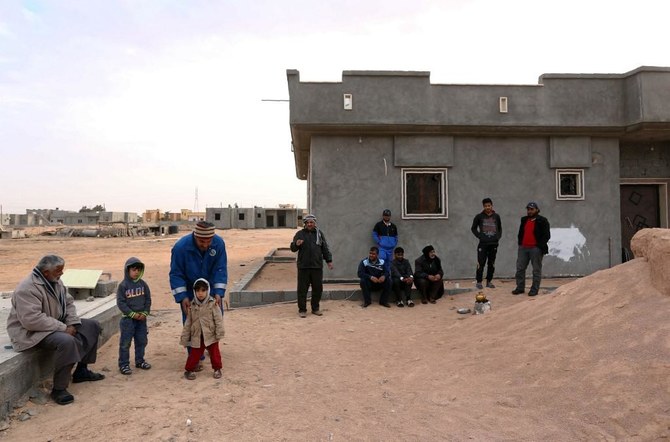
- LNA spokesman Ahmed Al-Mesmari said that western Libya is under total Turkish control
- “We expect an attack on Sirte by Turkey and the militias at any time,” he said
Saudi financial robo-advisory firm Abyan Capital secures $18m in funding
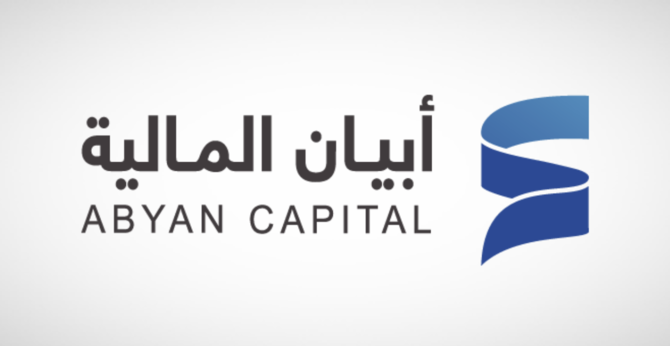
RIYADH: Financial robo-advisory firm Abyan Capital has secured $18 million in funding in further evidence of the growing confidence in the Kingdom’s artificial intelligence sector.
Led by STV, the funding round also saw participation from Aramco’s Wa’ed Ventures and RZM Investment.
Robo-advisors are digital platforms that utilize AI and machine learning algorithms to automate and optimize investment processes.
Founded in 2022 by Abdullah Al-Jeraiwi, Omar Al-Mania and Saleh Al-Aqeel, Abyan Capital is a financial services company that provides an automated solution and portfolio management for long-term investments.
“Abyan Capital stands out by unlocking the SR300 billion ($80 billion) investment management and wealth advisory sector for investors from all backgrounds in Saudi Arabia, through its mobile-first, robo-advisory model,” Yazeed Al-Turki, principal at STV, said in a statement.
In a short period of time, he said Abyan has enabled a large base of first-time investors to access multiple wealth management solutions, underscoring the team’s commitment to innovation and inclusivity.
“We are delighted to partner with Abdullah, Saleh and the team on their journey to redefine the wealth management ecosystem in the Kingdom,” Al-Turki added.
The company aims to utilize its newly secured funds to further enhance its platform, expand its suite of financial products, and accelerate its market penetration across the investment solution value chain.
“Today, we are proud that in a very short amount of time, Abyan has exceeded deposits of over SR1.4 billion and more than 100,000 portfolios invested. And we will be launching new diversified products soon with a goal to make Abyan the digital retail investment house,” said Al-Jeraiwi, the CEO.
California police move in to dismantle pro-Palestinian protest camp at UCLA

- The pre-dawn police crackdown at UCLA marked the latest flashpoint for mounting tensions on US college campuses
- Live TV footage showed about six protesters under arrest
LOS ANGELES: Hundreds of helmeted police muscled their way into a central plaza of the University of California at Los Angeles early on Thursday to dismantle a pro-Palestinian protest camp attacked the previous night by pro-Israel supporters.
The pre-dawn police crackdown at UCLA marked the latest flashpoint for mounting tensions on US college campuses, where protests over Israel’s conduct of the war in Gaza have led to student clashes with each other and law enforcement.
Live TV footage showed about six protesters under arrest, kneeling on the ground, their hands bound behind their backs with zip-ties.
Dozens of loud explosions were heard during the clash from flash-bang charges, or stun grenades, fired by police.
Demonstrators, some carrying makeshift shields and umbrellas, sought to block the officers’ advance by their sheer numbers, while shouting, “push them back” and flashing bright lights in the eyes of the police. Others on the opposite side of the camp gave up quickly, and were seen walking away with their hands over their heads under police escort.
Around sunset on Wednesday, officers in tactical gear had begun filing onto the UCLA campus and taking up positions adjacent to a complex of tents occupied by throngs of demonstrators, live footage from the scene showed.
Local television station KABC-TV estimated 300 to 500 protesters were hunkered down inside the camp, while around 2,000 more had gathered outside the barricades in support.
But the assembled police stood by on the periphery for hours before finally starting to force their way into the encampment around 3:15 a.m. PDT (1015 GMT), tearing down barricades and arresting occupants who refused to leave. The raid was led by a phalanx of California Highway Patrol officers carrying shields and batons.
Some of the protesters had been seen donning hard hats, goggles and respirator masks in anticipation of the siege a day after the university declared the encampment unlawful.
Prior to moving in, police urged demonstrators in repeated loudspeaker announcements to clear the protest zone, which occupied a plaza about the size of a football field between the landmark twin-tower auditorium Royce Hall and the main undergraduate library.
An initial group of Los Angeles police officers who briefly entered a corner of the camp were overwhelmed by demonstrators and forced to retreat, before reinforcements arrived by the busload about an hour later.
Violent clash precedes crackdown
UCLA had canceled classes for the day on Wednesday following a violent clash between the encampment’s occupants and a group of masked counter-demonstrators who mounted a surprise assault late Tuesday night on the tent city.
The occupants of the outdoor protest camp, set up last week, had remained mostly peaceful before the melee, in which both sides traded blows and doused each other with pepper spray.
Members of the pro-Palestinian group said fireworks were thrown at them and they were beaten with bats and sticks. University officials blamed the disturbance on “instigators” and vowed an investigation.
The confrontation went on for two or three hours into early Wednesday morning before police restored order. A spokesperson for California Governor Gavin Newsom later criticized the “limited and delayed campus law enforcement response” to the unrest as “unacceptable.”
As the much-expanded police force entered the campus on Wednesday night to clear the encampment, some of the protesters were heard yelling at them, “Where were you yesterday?“
Taylor Gee, a 30-year old pro-Palestinian protester and UCLA law student, said the police action felt “especially galling” to many protesters given the slow police response a night earlier.
“For them to come out the next night to remove us from the encampment, it doesn’t make any sense, but it also makes all the sense in the world.”
Protests at schools across the US
UCLA officials said the campus, which enrolls nearly 52,000 students, including undergraduates and graduate scholars, would remain shuttered except for limited operations on Thursday and Friday.
The protests follow the Oct. 7 attack on southern Israel by Hamas militants from the Gaza Strip and the ensuing Israeli offensive on the Palestinian enclave.
Students have rallied or set up tent encampments at dozens of schools across the US in recent days, calling for an immediate ceasefire in Gaza and demanding schools divest from companies that support Israel’s government. Many of the schools have called in police to quell the protests.
The demonstrations across the country have been met with counter-protesters accusing them of fomenting anti-Jewish hatred. The pro-Palestinian side, including Jews opposed to Israeli actions in Gaza, say they are being unfairly branded as antisemitic for criticizing Israel’s government and expressing support for human rights.
The issue has taken on political overtones in the run-up to the US presidential election in November, with Republicans accusing some university administrators of turning a blind eye to antisemitic rhetoric and harassment.
Wednesday night’s police action came a day after police in New York City arrested pro-Palestinian activists who occupied a building at Columbia University and removed a tent city from the campus of the Ivy League school.
Police arrested a total of about 300 people at Columbia and City College of New York, Mayor Eric Adams said. Many of those arrested were charged with trespassing and criminal mischief.
The clashes at UCLA and in New York were part of the biggest outpouring of US student activism since the anti-racism rallies and marches of 2020.
Ninety pro-Palestinian demonstrators — students and outsiders — were arrested at Dartmouth University in New Hampshire on Wednesday, the Hanover Police Department said. They were charged with criminal trespass and resisting arrest.
Israel president says US universities ‘contaminated by hatred, anti-Semitism’

- “We see prominent academic institutions, halls of history, culture, and education contaminated by hatred and anti-Semitism fueled by arrogance and ignorance,” he said
- “We watch in horror as the atrocities of October 7th against Israel are celebrated and justified“
JERUSALEM: Israel’s president on Thursday slammed US universities for campus unrest over Israel’s war in Gaza, saying these institutions were “contaminated by hatred and anti-Semitism.”
Isaac Herzog said in a special broadcast that he was issuing an urgent message of support to Jewish communities amid a “dramatic resurgence in anti-Semitism and following the hostilities and intimidation against Jewish students on campuses across the US in particular.”
“We see prominent academic institutions, halls of history, culture, and education contaminated by hatred and anti-Semitism fueled by arrogance and ignorance,” he said.
“We watch in horror as the atrocities of October 7th against Israel are celebrated and justified.”
His comments came as hundreds of police and protesters were in a tense stand-off at the University of California, Los Angeles and unrest over Israel’s war against Hamas in Gaza continued to spread in campuses across the United States.
Demonstrators have gathered in at least 30 US universities since last month, often erecting tent encampments to protest the soaring death toll in the Gaza Strip.
Israel’s offensive in Gaza has killed at least 34,596 people in Gaza, mostly women and children, according to the Hamas-run territory’s health ministry.
It comes in response to Hamas’s unprecedented attack on Israel on October 7, which resulted in the deaths of 1,170 people, mostly civilians, according to an AFP tally of Israeli official figures.
The militants also took about 250 hostages, 129 of whom remain in Gaza, including 34 presumed dead, Israel says.
The protests against the war have posed a challenge to US university administrators trying to balance free speech rights with allegations of criminal activity, anti-Semitism and hate speech.
In his statement Thursday, Herzog said his message was addressed “to our friends on campuses and in Jewish communities across the United States and all over the world.”
“The people of Israel are with you. We hear you. We see the shameless hostility and threats. We feel the insult, the breach of faith and breach of friendship. We share the apprehension and concern,” he said.
“In the face of violence, harassment and intimidation, as masked cowards smash windows and barricade doors, as they assault the truth and manipulate history, together we stand strong,” he said.
“As they chant for intifada and genocide, we will work — together — to free our hostages held by Hamas, and fight for civil liberties and our right to believe and belong, for the right to live proudly, peacefully and securely, as Jews, as Israelis — anywhere.”
Pointing to Holocaust Memorial Day commemorations next week, the Israeli president said “we will speak of the dark times of the past, and we will remember the miracle of our rebirth.”
“Together, we shall overcome,” he said. “In the face of this terrifying resurgence of anti-Semitism: Do not fear. Stand proud. Stand strong for your freedom.”
Indonesia explores opportunities in Suez Canal Economic Zone

- Egypt is Indonesia’s top trade partner in the North African region
- Indonesia has lately been increasing trade engagement with Egypt
JAKARTA: Indonesia is setting its sights on cooperation with the Suez Canal Economic Zone, authorities have said after a series of ministerial-level meetings in Cairo this week.
An Indonesian delegation led by Deputy Trade Minister Jerry Sambuaga met with officials from the Suez Canal Economic Zone on Sunday to explore opportunities, as Jakarta seeks to boost exports through the vital waterway that is the shortest route between Asia and Europe.
Closer cooperation with the Suez Canal Economic Zone would help Indonesia boost its exports to Egypt, as well as other parts of Africa, the Middle East, Europe and Central Asia, Sambuaga said.
“This is in keeping with the fact that more than 8 percent of global trade goes through the Suez Canal annually … We hope that in the future, Indonesia and Egypt will have stronger cooperation and we will see an increase in the export of Indonesian goods to Egypt,” the minister added.
Southeast Asia’s biggest economy has been increasing its trade engagement with Egypt, which it sees as a gateway for exports to other African countries.
Sambuaga’s trip to Cairo followed the visit of Trade Minister Zulkifli Hasan just last year, when he signed a memorandum of understanding with Egyptian Minister of Trade and Industry Ahmed Samir to form a joint trade committee to boost commercial relations.
Earlier in March, Indonesia worked alongside Malaysia to explore the possibilities of a free trade pact between the Association of Southeast Asian Nations and Egypt.
Egypt ranks third among Indonesia’s top export destinations in the Middle East and North Africa, just after the UAE and Saudi Arabia.
With bilateral trade volume worth around $1.58 billion in 2023, Egypt is Indonesia’s top trade partner in North Africa alone. Palm oil, coffee beans, and coconut oil are some of Indonesia’s main exports to Egypt.
Specialist hospital is top healthcare institution

- Report highlighted a 31 percent increase in the brand value of the institution, surpassing SR5.6 billion
- Increase is attributed to its commitment to integrate the latest medical technologies and treatments
RIYADH: King Faisal Specialist Hospital and Research Centre (KFSH&RC) has led its sector for the second successive year, ranking as the top healthcare institution in the Kingdom and the Middle East.
It stands out as the only hospital globally to be among the top 10 valuable brands in its country, according to two reports by Brand Finance about the top 50 most valuable brands in Saudi Arabia, and the top 150 most valuable brands in the Middle East for 2024.
The report highlighted a 31 percent increase in the brand value of the institution, surpassing SR5.6 billion ($1.49 billion). This increase is attributed to its commitment to integrate the latest medical technologies and treatments, provide specialized medical care according to the latest international standards, and continuously develop research and patient care.
Muhannad Abdullah Kadi, chief corporate communications and marketing officer at KFSH&RC, said: “This achievement reflects the hospital’s commitment to achieving the highest quality standards and providing exceptional healthcare, as well as the value it provides to beneficiaries.”
He stressed that being among the top 10 most valuable brands in the Kingdom was evidence of the success of the transformations taking place in the healthcare sector in Saudi Arabia.



